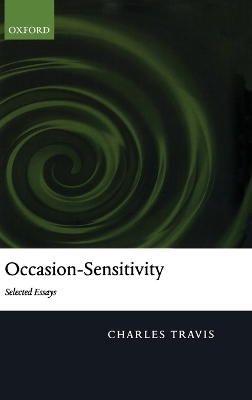
Occasion-Sensitivity
Selected Essays
Seiten
2008
Oxford University Press (Verlag)
978-0-19-923033-4 (ISBN)
Oxford University Press (Verlag)
978-0-19-923033-4 (ISBN)
Charles Travis presents a series of essays in which he has developed his distinctive view of the relation of thought to language. He argues that there are varying conditions of correctness which determine whether words express a given concept, and thus that meaning does not determine truth conditions. The implications of this view are intriguing.
Charles Travis presents a series of essays in which he has developed his distinctive view of the relation of thought to language. The key idea is 'occasion-sensitivity': what it is for words to express a given concept is for them to be apt for contributing to any of many different conditions of correctness (notably truth conditions). Since words mean what they do by expressing a given concept, it follows that meaning does not determine truth conditions. This view ties thoughts less tightly to the linguistic forms which express them than traditional views of the matter, and in two directions: a given linguistic form, meaning fixed, may express an indefinite variety of thoughts; one thought can be expressed in an indefinite number of syntactically and semantically distinct ways. Travis highlights the importance of this view for linguistic theory, and shows how it gives new form to a variety of traditional philosophical problems.
Charles Travis presents a series of essays in which he has developed his distinctive view of the relation of thought to language. The key idea is 'occasion-sensitivity': what it is for words to express a given concept is for them to be apt for contributing to any of many different conditions of correctness (notably truth conditions). Since words mean what they do by expressing a given concept, it follows that meaning does not determine truth conditions. This view ties thoughts less tightly to the linguistic forms which express them than traditional views of the matter, and in two directions: a given linguistic form, meaning fixed, may express an indefinite variety of thoughts; one thought can be expressed in an indefinite number of syntactically and semantically distinct ways. Travis highlights the importance of this view for linguistic theory, and shows how it gives new form to a variety of traditional philosophical problems.
Charles Travis is professor at King's College, London
PART I: OCCASION SENSITIVITY ; 1. On What Is Strictly Speaking True ; 2. Annals of Analysis ; 3. Meaning's Role in Truth ; 4. Pragmatics ; 5. Sublunary Intuitionism ; 6. Insensitive Semantics ; 7. Aristotle's Condition ; PART II: APPLICATIONS ; 8. Are Belief Ascriptions Opaque? ; 9. Vagueness, Observation and Sorites ; 10. Attitudes as States ; 11. On Concepts of Objects ; 12. On Constraints of Generality ; 13. A Sense of Occasion
| Erscheint lt. Verlag | 28.2.2008 |
|---|---|
| Verlagsort | Oxford |
| Sprache | englisch |
| Maße | 164 x 242 mm |
| Gewicht | 660 g |
| Themenwelt | Geisteswissenschaften ► Philosophie ► Erkenntnistheorie / Wissenschaftstheorie |
| Geisteswissenschaften ► Philosophie ► Sprachphilosophie | |
| ISBN-10 | 0-19-923033-1 / 0199230331 |
| ISBN-13 | 978-0-19-923033-4 / 9780199230334 |
| Zustand | Neuware |
| Haben Sie eine Frage zum Produkt? |
Mehr entdecken
aus dem Bereich
aus dem Bereich
die Grundlegung der modernen Philosophie
Buch | Softcover (2023)
C.H.Beck (Verlag)
18,00 €
Buch | Softcover (2023)
Reclam, Philipp (Verlag)
7,00 €

![Was heißt Denken?. Vorlesung Wintersemester 1951/52. [Was bedeutet das alles?] - Martin Heidegger](/media/113619842)
